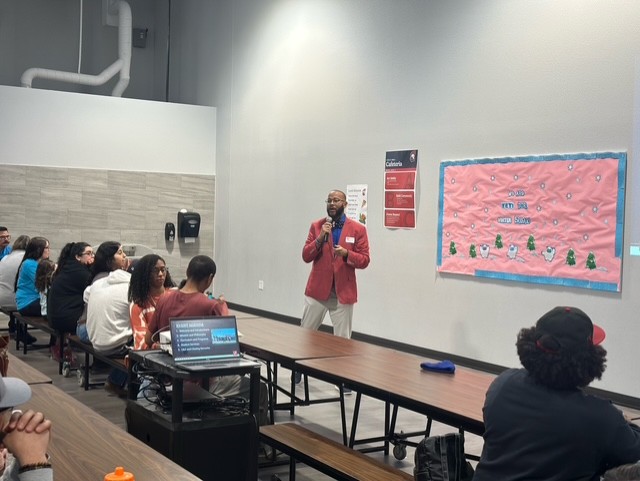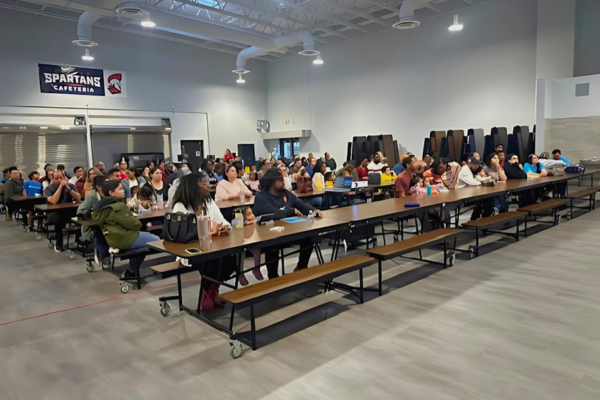Bridging the Gap: How Parent University Sparked Innovation and Rebuilt Trust Post-Pandemic
May 28, 2025
This is part of the blog series, 5 Years Later: Lessons, Innovation, and the Future of Public Education, exploring how PreK-12 education has evolved and what lessons we carry forward. This series highlights the resilience, creativity, and strategic adaptations that have redefined public education since the pandemic. Read more posts from the series here.
The COVID-19 pandemic served as a mirror—exposing fractures in the relationship between schools and the families they serve. While the academic disruption was evident, what became increasingly undeniable was the erosion of trust, collaboration, and transparency between campuses and communities.
As a school leader determined not to let crisis become complacency, I leaned into the power of partnership, launching a Parent University initiative that has since transformed school culture, rebuilt trust, and driven real academic and social gains.
Innovation Sparked by Crisis: The Birth of Parent University
The forced isolation during the pandemic revealed something many of us in education already knew—but hadn’t yet fully addressed. Families wanted to help, but many didn’t know how. Traditional "Parent Nights" no longer cut it. We needed something more intentional, responsive, and relationship-based. That’s when we developed Parent University—a structured and collaborative series of workshops aimed at turning parents into partners, not just participants.
The first step in rebuilding trust is showing that their voice matters.
This wasn’t a cookie-cutter program pulled off a shelf. It began with a question: “What do our parents need to feel empowered?” So we did what any data-driven leader would do—we asked them.
Using a summer survey, we collected responses from over 300 families. Topics ranged from navigating IEPs to supporting math fluency at home. We didn't assume. We listened. Then we built a semester-long calendar that addressed the most requested sessions first. Every presentation was tied to a need our families identified. That was the first step in rebuilding trust: showing that their voice matters.
Trust Through Transparency: Community Partnerships in Action
Post-survey, we didn’t keep the data behind closed doors. We published the results, gave shoutouts to parent responders, and made the process transparent. From there, we recruited presenters from our staff, local businesses, and even among parents themselves. We turned our school into a hub—not just of learning for students—but for the entire family unit.

For example, one of our most impactful sessions came from a local credit union presenting "Budgeting Basics for Busy Families." The turnout was record-breaking. What made it special wasn’t just the content—it was the collaboration. Parents saw the school not as a top-down authority but as a connector, a bridge to other resources they valued.
That bridge-building extended into cultural celebrations, too. A family-led workshop during Hispanic Heritage Month on traditions and storytelling brought generations together. We saw grandparents reading with students, parents sharing their favorite stories, and teachers witnessing firsthand the rich cultural literacy already alive in our families. It reminded us: engagement isn’t always academic—it’s relational.
The Metrics That Matter: Culture Shift in Numbers
The cultural impact was tangible, but we also saw it in the data. Our Net Promoter Scores (NPS)—a critical measure of parent satisfaction—skyrocketed. At Legacy Laveen, the score jumped from 9 to 66 within a year. At Legacy Maricopa, we moved from 16 to 32. And perhaps most dramatically, at Legacy Cibolo, we transformed a -13 score into a 23.
But numbers alone don’t tell the full story. Parents who once were passive or skeptical became our biggest ambassadors. They began volunteering more. They started showing up to academic nights. They spoke positively about the school in community Facebook groups. One parent even shared during our Fall Festival, “This school actually sees us. They ask us what we need and then deliver.”

Spirit Night and the Power of a Slice
If there’s one moment that encapsulates the power of authentic engagement, it was our Spirit Night at a local pizza shop. What began as a fundraiser turned into a celebration of connection. We wore school shirts, played student-made trivia games, and invited teachers to serve slices. A father of a 4th grader came up and said, “This is the first time I’ve seen my son’s teacher outside of school. It means a lot.”
That one evening strengthened the relationship between parents and staff more than any formal meeting could. It was casual. It was joyful. And most importantly, it was real.
Advice for School Leaders: Make Engagement a Priority, Not a Perk
For leaders wanting to rebuild or strengthen family engagement post-pandemic, here’s what I’ve learned:
Listen First, Act Second – Use surveys to find out what families want. Don’t assume.
Be Transparent – Share data, share plans, and be open about your goals.
Empower, Don’t Just Inform – Parent University wasn’t about telling parents what to do; it was about showing them how to do it with confidence.
Be Consistent – Don’t stop after one event. Build a schedule. Communicate often.
Celebrate the Small Moments – A Spirit Night, a themed workshop, or a student-led presentation can create lasting trust.
The pandemic challenged us—but it also changed us. It reminded us that schools aren’t just academic institutions—they’re emotional ecosystems.
The pandemic challenged us—but it also changed us. It reminded us that schools aren’t just academic institutions—they’re emotional ecosystems. When families feel connected, students thrive. And when schools invest in authentic, sustained engagement, they’re not just leading—they’re transforming.
And it all starts with a simple belief: Parents aren’t on the sidelines. They’re our strongest teammates.




